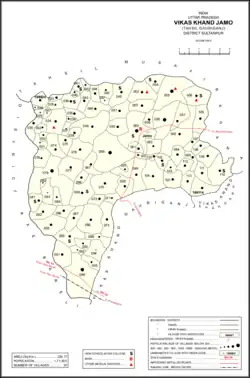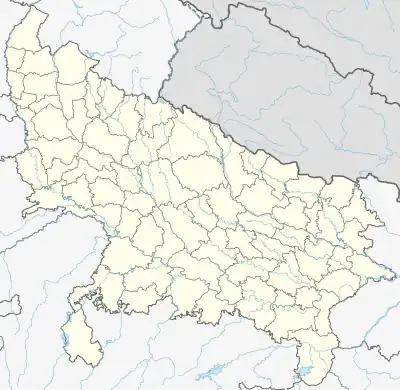Bakhshgarh
Bakhshgarh is a village in Jamo block of Amethi district, Uttar Pradesh, India.[2] As of 2011, it has a population of 1,628 people, in 275 households.[2] It has one primary school and no healthcare facilities and it does not host a weekly haat or a permanent market.[2] It belongs to the nyaya panchayat of Mawai.[3]
Bakhshgarh | |
|---|---|
Village | |
 Map showing Bakhshgarh (#073) in Jamo CD block | |
 Bakhshgarh Location in Uttar Pradesh, India | |
| Coordinates: 26.30422°N 81.634864°E[1] | |
| Country | |
| State | Uttar Pradesh |
| Division | Faizabad division |
| District | Amethi |
| Area | |
| • Total | 3.611 km2 (1.394 sq mi) |
| Population (2011)[2] | |
| • Total | 1,628 |
| • Density | 450/km2 (1,200/sq mi) |
| Languages | |
| • Official | Hindi, Urdu |
| Time zone | UTC+5:30 (IST) |
The 1951 census recorded Bakhshgarh as comprising 10 hamlets, with a total population of 781 people (397 male and 384 female), in 152 households and 146 physical houses.[4] The area of the village was given as 846 acres.[4] 11 residents were literate, all male.[4] The village was listed as belonging to the pargana of Gaura Jamo and the thana of Gauriganj.[4]
The 1961 census recorded Bakhshgarh (as "Bakshgarh") as comprising 10 hamlets, with a total population of 802 people (424 male and 378 female), in 169 households and 169 physical houses.[5] The area of the village was given as 846 acres.[5]
The 1981 census recorded Bakhshgarh (as "Bakshgarh") as having a population of 1,010 people, in 229 households, and having an area of 342.38 hectares.[6] The main staple foods were listed as wheat and rice.[6]
The 1991 census recorded Bakhshgarh (as "Bakshgarh") as having a total population of 1,116 people (612 male and 504 female), in 254 households and 254 physical houses.[3] The area of the village was listed as 361.00 hectares.[3] Members of the 0-6 age group numbered 197, or 18% of the total; this group was 52% male (103) and 48% female (94).[3] Members of scheduled castes numbered 262, or 23.5% of the village's total population, while no members of scheduled tribes were recorded.[3] The literacy rate of the village was 23% (188 men and 27 women, counting only people age 7 and up).[3] 415 people were classified as main workers (358 men and 57 women), while 32 people were classified as marginal workers (all women); the remaining 669 residents were non-workers.[3] The breakdown of main workers by employment category was as follows: 265 cultivators (i.e. people who owned or leased their own land); 132 agricultural labourers (i.e. people who worked someone else's land in return for payment); 1 worker in livestock, forestry, fishing, hunting, plantations, orchards, etc.; 0 in mining and quarrying; 6 household industry workers; 2 workers employed in other manufacturing, processing, service, and repair roles; 0 construction workers; 1 employed in trade and commerce; 0 employed in transport, storage, and communications; and 8 in other services.[3]
References
- "Geonames Search". Do a radial search using these coordinates here.
- "Census of India 2011: Uttar Pradesh District Census Handbook - Sultanpur, Part A (Village and Town Directory)" (PDF). Census 2011 India. pp. 147–63. Retrieved 17 December 2021.
- Census 1991 Series-25 Uttar Pradesh Part-XII B Village & Townwise Primary Census Abstract District Census Handbook District Raebareli (PDF). 1992. pp. xxiv–xxviii, 86–7. Retrieved 17 December 2021.
- Census of India, 1951: District Census Handbook Uttar Pradesh (49 - Rae Bareli District) (PDF). Allahabad. 1955. pp. 126–7. Retrieved 17 December 2021.
{{cite book}}: CS1 maint: location missing publisher (link) - Census 1961: District Census Handbook, Uttar Pradesh (44 - Sultanpur District) (PDF). Lucknow. 1965. pp. xviii–xix. Retrieved 17 December 2021.
{{cite book}}: CS1 maint: location missing publisher (link) - Census 1981 Uttar Pradesh: District Census Handbook Part XIII-A: Village & Town Directory, District Rae Bareli (PDF). 1982. pp. 48–9. Retrieved 17 December 2021.